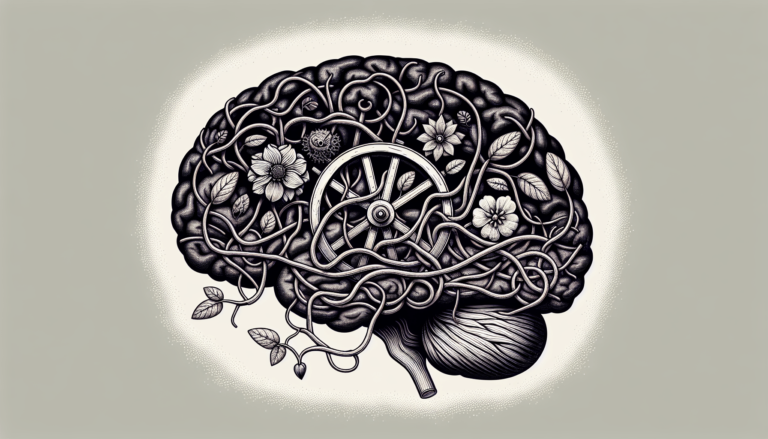Techniques For Boosting Self-Esteem And Inner Strength
In this article, you will discover effective techniques that can help you enhance your self-esteem and cultivate inner strength. Building a strong sense of self-worth and resilience is crucial for navigating through life’s challenges and achieving personal growth. By implementing these techniques into your daily routine, you can develop a positive mindset, overcome self-doubt, and unlock your full potential. So, let’s explore these empowering strategies that will empower you to embrace your uniqueness and embrace life with confidence.
Positive Self-Talk
Recognize negative self-talk patterns
In order to boost your self-esteem and inner strength, it’s important to recognize and address any negative self-talk patterns that may be holding you back. Negative self-talk involves those inner voices that criticize and undermine your abilities and worth. Paying attention to these patterns is the first step towards changing them. Take note of when negative thoughts arise and the specific triggers that contribute to them. By becoming aware of these patterns, you can start challenging and replacing them with more positive and empowering beliefs.
Replace negative thoughts with positive affirmations
Once you’ve identified your negative self-talk patterns, it’s time to replace those thoughts with positive affirmations. Positive affirmations are statements that help promote self-acceptance, self-confidence, and self-love. Repeat these affirmations to yourself regularly, especially in moments when negative thoughts arise. Examples of positive affirmations include “I am capable of achieving my goals,” “I am worthy of love and respect,” and “I have the power to overcome any challenge.” By replacing negative thoughts with positive affirmations, you can gradually rewire your brain to focus on your strengths and abilities.
Practice self-compassion
Self-compassion is a key aspect of building self-esteem and inner strength. It involves treating yourself with kindness, understanding, and nonjudgment when facing difficulties or making mistakes. Practice self-compassion by acknowledging your imperfections and failures without harsh self-criticism. Instead of beating yourself up over a mistake, remind yourself that everyone makes mistakes and that you are still deserving of love and acceptance. Treat yourself as you would treat a close friend or loved one, offering words of encouragement and support. Developing self-compassion allows you to nurture your self-esteem and embrace your journey towards personal growth and success.
Set Realistic Goals
Break big goals into smaller, achievable ones
Setting goals is essential for personal growth, but it’s important to make sure they are realistic and achievable. Sometimes big, long-term goals can feel overwhelming, leading to self-doubt and a lack of motivation. To combat this, break down your bigger goals into smaller, more manageable ones. This allows you to focus on one step at a time, making the process feel less daunting. Each small achievement brings you closer to your ultimate goal and helps boost your self-confidence.
Celebrate small victories
Don’t forget to celebrate your small victories along the way. Often, we are so focused on the end result that we forget to acknowledge and appreciate the progress we’ve made. By celebrating small victories, you reinforce positive behavior and build self-esteem. Whether it’s completing a task or overcoming a challenge, take the time to acknowledge and reward yourself for your accomplishments. This recognition will motivate you to keep going and remind you of your capabilities.
Focus on progress rather than perfection
Perfectionism can be detrimental to your self-esteem and inner strength. Instead of striving for perfection, focus on progress. Recognize that progress, no matter how small, is still an achievement. Embrace the journey and the learning opportunities that come with it. Accept that making mistakes is a natural part of growth and that setbacks don’t define your worth. By shifting your focus from perfection to progress, you allow yourself to embrace your imperfections and celebrate the steps you take towards your goals.

Develop Healthy Relationships
Surround yourself with supportive and positive people
The relationships you have with others can greatly influence your self-esteem and inner strength. Surround yourself with supportive and positive people who uplift and believe in you. These individuals will provide emotional support, encouragement, and constructive feedback when needed. Their presence in your life will help you develop a sense of belonging and reinforce your self-worth. Seek out friends, family members, mentors, or support groups who share similar values and can offer guidance and support along your journey.
Set boundaries with toxic individuals
While fostering healthy relationships is important, it’s equally crucial to set boundaries with toxic individuals. Toxic relationships can drain your energy, erode your self-confidence, and hinder your personal growth. Recognize the signs of toxic behavior, such as manipulation, disrespect, or constant negativity, and distance yourself from those individuals. This doesn’t mean completely cutting them out of your life, but it does mean putting your well-being first. Set clear boundaries and communicate your needs with assertiveness. Surrounding yourself with positive influences allows you to cultivate a nurturing and uplifting environment that boosts your self-esteem.
Seek professional help if needed
Sometimes, developing healthy relationships and addressing personal struggles may require professional help. Recognizing when you need support and reaching out to therapists, counselors, or coaches can be a valuable step in boosting your self-esteem and inner strength. These professionals can offer guidance, tools, and strategies tailored to your specific needs. Seeking professional help is not a sign of weakness but rather a proactive step towards self-improvement. They can provide you with the resources and perspective necessary to navigate challenges and foster personal growth.
Practice Gratitude
Keep a gratitude journal
Practicing gratitude is a powerful tool for enhancing self-esteem and inner strength. One way to incorporate gratitude into your daily life is by keeping a gratitude journal. Take a few minutes each day to write down things you are grateful for. This could be anything from a supportive friend to a beautiful sunset. The act of acknowledging and appreciating the positive aspects of your life helps shift your focus away from negativity and towards a more positive mindset. Over time, this practice can transform your outlook and increase your overall sense of well-being.
Express gratitude to others
In addition to keeping a gratitude journal, express your gratitude to others. Take the time to thank people who have positively impacted your life or have shown kindness towards you. A simple thank-you note, a heartfelt conversation, or an act of kindness towards others can create a strong sense of connection and foster positivity in your relationships. By expressing gratitude, you not only uplift others but also remind yourself of the positive aspects of your life, boosting your self-esteem and cultivating a grateful mindset.
Focus on the present moment and appreciate it
Practicing gratitude also involves focusing on the present moment and appreciating the beauty of it. Often, we get caught up in worries about the future or regrets about the past, which can contribute to feelings of dissatisfaction and self-doubt. Train yourself to be mindful and fully present in the current moment. Take notice of the small joys, such as the warmth of sunshine on your skin, the taste of your favorite meal, or the laughter of loved ones. By savoring and fully experiencing these moments, you cultivate gratitude and develop a deeper sense of inner strength.

Self-Care
Prioritize your physical and mental well-being
Self-care is crucial for building self-esteem and inner strength. Prioritize your physical and mental well-being by engaging in activities that promote your overall health. This includes getting enough sleep, eating nutritious meals, and exercising regularly. Taking care of your physical health not only has positive effects on your body but also helps boost your mood and confidence. Additionally, don’t forget to prioritize your mental health by engaging in activities that bring you joy and relaxation, such as reading, spending time in nature, or practicing hobbies. By investing in self-care, you demonstrate self-love and prioritize your personal growth.
Engage in activities that bring you joy
Incorporating activities that bring you joy into your daily life is another essential aspect of building self-esteem and inner strength. Identify activities that make you feel alive and fulfilled, and make time for them regularly. This could be anything from painting, hiking, dancing, cooking, or playing a musical instrument. Engaging in activities that bring you joy not only boosts your self-esteem but also provides a sense of purpose and fulfillment. By prioritizing activities that align with your passions and interests, you are investing in your personal growth and well-being.
Practice relaxation techniques
Relaxation techniques are valuable tools for managing stress and nurturing your inner strength. Incorporate relaxation techniques such as deep breathing exercises, meditation, yoga, or mindfulness into your daily routine. These practices promote a sense of calm, reduce anxiety, and help you develop a more positive outlook. Make time for regular relaxation sessions, whether it’s a short meditation in the morning or a yoga session in the evening. By dedicating time to relax and recharge, you enhance your overall well-being and strengthen your ability to handle challenges with grace and resilience.
Challenge Negative Beliefs
Identify negative beliefs about yourself
Negative beliefs about oneself can significantly impact self-esteem and inner strength. Take the time to reflect on your beliefs and identify any negative or self-limiting ones. These beliefs may include thoughts like “I’m not smart enough,” “I will never succeed,” or “I don’t deserve happiness.” By bringing these beliefs to the surface, you can begin to challenge and change them.
Gather evidence to dispute these beliefs
Once you’ve identified your negative beliefs, gather evidence to dispute them. Challenge the validity of these beliefs by seeking proof to the contrary. For example, if you believe you’re not smart enough, remind yourself of past achievements and instances where you’ve demonstrated intelligence. Look for evidence that contradicts these negative beliefs and highlight your strengths and accomplishments. By accumulating positive evidence, you can weaken the grip of negative beliefs and cultivate a more positive self-perception.
Replace them with positive and empowering beliefs
After gathering evidence, it’s time to replace your negative beliefs with positive and empowering ones. Reframe your thoughts by intentionally choosing more constructive and uplifting beliefs. For example, instead of “I will never succeed,” replace it with “I am capable of achieving my goals with perseverance and effort.” By consciously choosing positive beliefs, you train your mind to focus on your strengths, capabilities, and potential. This shift in mindset will enhance your self-esteem and empower you to pursue your dreams and aspirations.
Reframe Failure
View failures as opportunities for growth
Failure is a natural part of the learning process and an opportunity for growth. Instead of viewing failures as a reflection of your worth, reframe them as opportunities to learn, develop resilience, and improve. Embrace mistakes as valuable lessons that contribute to personal growth and allow yourself to make them without fear of judgment. Understand that failure is not a final destination but rather a stepping stone towards success. By reframing failure, you empower yourself to persist in the face of challenges and boost your self-confidence.
Learn from past mistakes
In order to reframe failure, it’s important to learn from past mistakes. Take the time to reflect on what went wrong and analyze how you can improve in the future. Instead of dwelling on the negative aspects of a failure, focus on the lessons learned and the skills gained. By viewing mistakes as opportunities for growth and learning, you can shift your mindset from fear of failure to a mindset of continuous improvement. Use these lessons to adapt your strategies, make necessary adjustments, and move forward with increased confidence and resilience.
Embrace the journey rather than focusing solely on the end result
While it’s important to have goals and aspirations, it’s equally important to embrace the journey towards those goals. Often, we put all our focus on the end result, neglecting to appreciate the personal growth and valuable experiences gained along the way. Shift your perspective and embrace the process, acknowledging that each step taken is an achievement in itself. Be present in each moment, savoring the lessons learned, the skills acquired, and the progress made. By embracing the journey, you cultivate a sense of appreciation for your efforts and foster inner strength and self-confidence.
Practice Mindfulness
Engage in mindfulness meditation
Mindfulness meditation is a practice that involves focusing your attention on the present moment without judgment. Dedicate time each day to engage in mindfulness meditation, where you bring awareness to your breath, bodily sensations, and thoughts. This practice helps calm the mind, reduce stress, and foster a sense of inner peace. By regularly practicing mindfulness meditation, you develop the ability to observe your thoughts and emotions without getting caught up in them. This cultivates self-awareness and empowers you to respond to challenges with clarity and composure.
Pay attention to your thoughts and emotions without judgment
In addition to formal mindfulness meditation, practice paying attention to your thoughts and emotions throughout the day without judgment. By becoming more aware of your inner dialogue and emotional state, you gain valuable insights into your patterns of thinking and the impact they have on your self-esteem. Notice when negative thoughts arise and the emotions that accompany them. Instead of getting carried away by these thoughts and emotions, observe them with curiosity and without judgment. By developing this awareness, you create space for more self-compassionate and empowering thoughts.
Cultivate a sense of inner peace and acceptance
The practice of mindfulness can help cultivate a sense of inner peace and acceptance. By training your mind to focus on the present moment, you detach from worries about the future or regrets about the past. Embrace the present moment as it is, free from judgment and expectation. Accept yourself and your circumstances without resistance. Cultivating a sense of inner peace and acceptance allows you to let go of self-doubt and embrace your worthiness. By finding peace within yourself, you strengthen your inner resilience and build a solid foundation of self-esteem.
Celebrate your strengths
Identify your unique strengths and talents
Recognizing and celebrating your unique strengths and talents is a powerful way to boost your self-esteem. Take the time to reflect on your abilities, passions, and qualities that make you special. Identify the skills in which you excel and the positive attributes you possess. By acknowledging these strengths, you enhance your self-perception and cultivate a greater sense of self-worth. Embrace your individuality and the unique contributions you bring to the world.
Focus on utilizing and developing these strengths
Once you’ve identified your strengths, focus on utilizing and developing them in your daily life. Pay attention to activities or opportunities that allow you to leverage your strengths. By doing so, you not only feel more competent and confident but also experience a sense of fulfillment and purpose. Seek out ways to further develop your strengths through learning, practice, and challenging yourself. By aiming to continuously improve and maximize your strengths, you build self-esteem and unlock your potential.
Recognize your accomplishments and give yourself credit
In addition to celebrating your strengths, it’s important to recognize your accomplishments and give yourself credit for your successes. Often, we tend to downplay our achievements or attribute them to luck or external factors. Instead, acknowledge and appreciate your hard work, dedication, and growth. Make a habit of celebrating your milestones, whether big or small. Treat yourself to something special, share your accomplishments with loved ones, or simply pat yourself on the back. By recognizing and celebrating your accomplishments, you reinforce positive self-perception and boost your self-esteem.
Seek Help
Reach out to trusted friends, family, or professionals
Recognizing when you need help is a sign of strength and self-awareness. If you find yourself struggling with low self-esteem or emotional setbacks, don’t hesitate to reach out to trusted friends, family members, or professionals. Share your thoughts, feelings, and concerns with them, and allow them to provide support and guidance. Often, talking to someone who cares about you can offer new perspectives, validation, and encouragement. Surrounding yourself with a support system can help you navigate challenges and build resilience.
Attend support groups or therapy sessions
In addition to support from friends and family, attending support groups or therapy sessions can be incredibly beneficial. Support groups offer a space for individuals to share their experiences, gain insights, and receive empathy from others who are going through similar challenges. Therapists and counselors can provide a safe and confidential environment to explore your feelings, uncover underlying issues, and develop coping strategies. Engaging in these forms of support can facilitate personal growth, enhance self-esteem, and foster a sense of belonging.
Learn from the experiences and wisdom of others
Seeking help also involves learning from the experiences and wisdom of others. Reading books, listening to podcasts, or attending workshops or seminars on topics related to self-esteem and personal growth can provide valuable insights and tools. Learning from experts in the field can broaden your perspective and offer new strategies for boosting self-esteem. Additionally, engaging in discussions and sharing experiences with others who have overcome similar challenges can inspire and motivate you along your journey. Embrace the wealth of knowledge available and actively seek opportunities to learn and grow.
Incorporating these techniques for boosting self-esteem and inner strength into your life can have a profound impact on your overall well-being and happiness. Remember that building self-esteem is a journey and that progress takes time. Be patient, kind, and compassionate with yourself as you navigate challenges and celebrate your growth. With dedication and practice, you can cultivate a strong sense of self-worth, develop resilience, and embrace your fullest potential.







